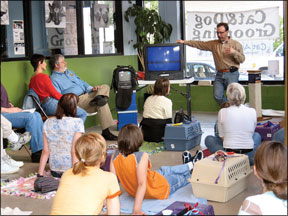Imagine a cat that goes into its carrier on command, sits calmly while its claws are clipped, lies down for grooming and knows a few tricks. And while youre dreaming of the perfect feline, add this idea to your fantasy: The cat takes pills easily and actually uses the scratching post – and not the back of your couch. Wake up! It was a nice dream, wasnt it? Actually, this image of a feline housepet may not be so far-fetched – particularly if cat owners take advantage of a new training concept called “kitty kindergarten.” The program is very similar in purpose Bev Caldwell 288 to “puppy preschool” in that its main focus is to save pet lives by educating owners – and having some fun along the way. 
A New Concept from Down Under
Though the concept for a kitten training program is relatively new to the United States, it has been in active use in Australia for nearly ten years. Kersti Seksel, BVSc, MA, of Sydney, Australia, a board-certified veterinary surgeon, is credited with developing perhaps the first kitten training program, Kitty Kindy. A few years ago, pet journalist Steve Dale of Chicago, Illinois, introduced a modification of this kitten training program, “Kitty-K,” at the American Association of Feline Practitioners 2005 Fall Conference (visit his website at www.stevedalepetworld.com).
As word spreads of the potential benefits of this class, a sprinkling of training facilities, shelters and veterinary clinics across the country have begun offering kitty kindergarten classes.
Kittens must be between the ages of seven and 13 weeks and be healthy and up-to date on their vaccines. The classes are typically set up so that new kitten owners attend a pair of one-hour sessions. Class instruction includes a socialization time for kittens and an opportunity for them to play with a variety of toys. Class discussions include expert advice on cat behaviors and how to acclimate kittens to common life experiences, such as veterinary exams, travel in cars and grooming. Additionally, kitten owners are shown how to shape behaviors through clicker training and teach their kittens a few tricks.
“The biggest benefit of kitty kindergarten is owner information,” says Katherine Houpt, VMD, PhD, the James Law Professor of Animal Behavior in Cornell Universitys College of Veterinary Medicine.
Issues such as not using the litter box, scratching furniture and aggression (biting or scratching people) can cause major issues in a cat-owning family, Dr. Houpt says. “People often expect cats to be problem-free,” she notes. Compared to other species as pets, cats are not very demanding – but this doesnt mean that they dont pose issues in the home.
Attending a class that outlines feline behavior and how to shape and manage these behaviors – before they become problems in the home – can help not only to improve the relationship between owner and cat, but can, in more extreme cases, save lives, says certified animal behavior trainer Ailigh Vanderbush, who offers kitty kindergarten classes at her nonprofit animal education and training facility, Animalia, in Indianapolis, Indiana.
Peggy Oertwig, a trainer for The Dogs Spot Dog Training Center and a pet-sitter in Kansas City, Missouri, says that she sees far too many cats in her petsitting business that have been banished to the basement for what owners interpret as “behavioral issues.” Oertwig, who designed a kitty kindergarten class for The Dogs Spot, relates that many times the solution to a perceived problem can be very simple if the owner understands what her cat is doing and why, and how to change the behavior to mold the cat into a better pet.
Lessons Not Just for Kittens!
Though the classes are geared for new kitten owners, Oertwig and Vanderbush emphasize that owners of all age cats can benefit from the lessons taught at kitty kindergarten. Older kittens and adult cats must be left at home (research indicates that older kittens dont do as well with socialization, says Oertwig, and adult cats may find attending class to be stressful); however, owners can attend the classes and learn how to reshape their cats behaviors. They may also be interested in taking the training up to the next level, says Oertwig, who points out, “Some cats make wonderful therapy cats. With clicker training, owners can amaze patients – and their friends – with their cats tricks.”
Shaping behaviors is, of course, training. When the words “training” and “cats” are used in the same sentence, many people become skeptical of the program, says Oertwig. “They see it as a gimmick as opposed to real training.” So skeptical are owners, in fact, that Oertwig attributes much of the slow acceptance of kitty kindergarten classes to the publics reluctance to recognize a cats potential for training.
Once kitten owners experience a class and see for themselves what their cats can do, it often makes believers out of even the most skeptical owners. “People are amazed,” says Vanderbush, who notes that these training classes can be amazing on many different levels. “Its about changing owner expectations as to what their cats can do, an opportunity for people to reinterpret their relationships with their cats and to develop a much more positive, interactive bond,” explains Vanderbush. “Its really pretty exciting.”



